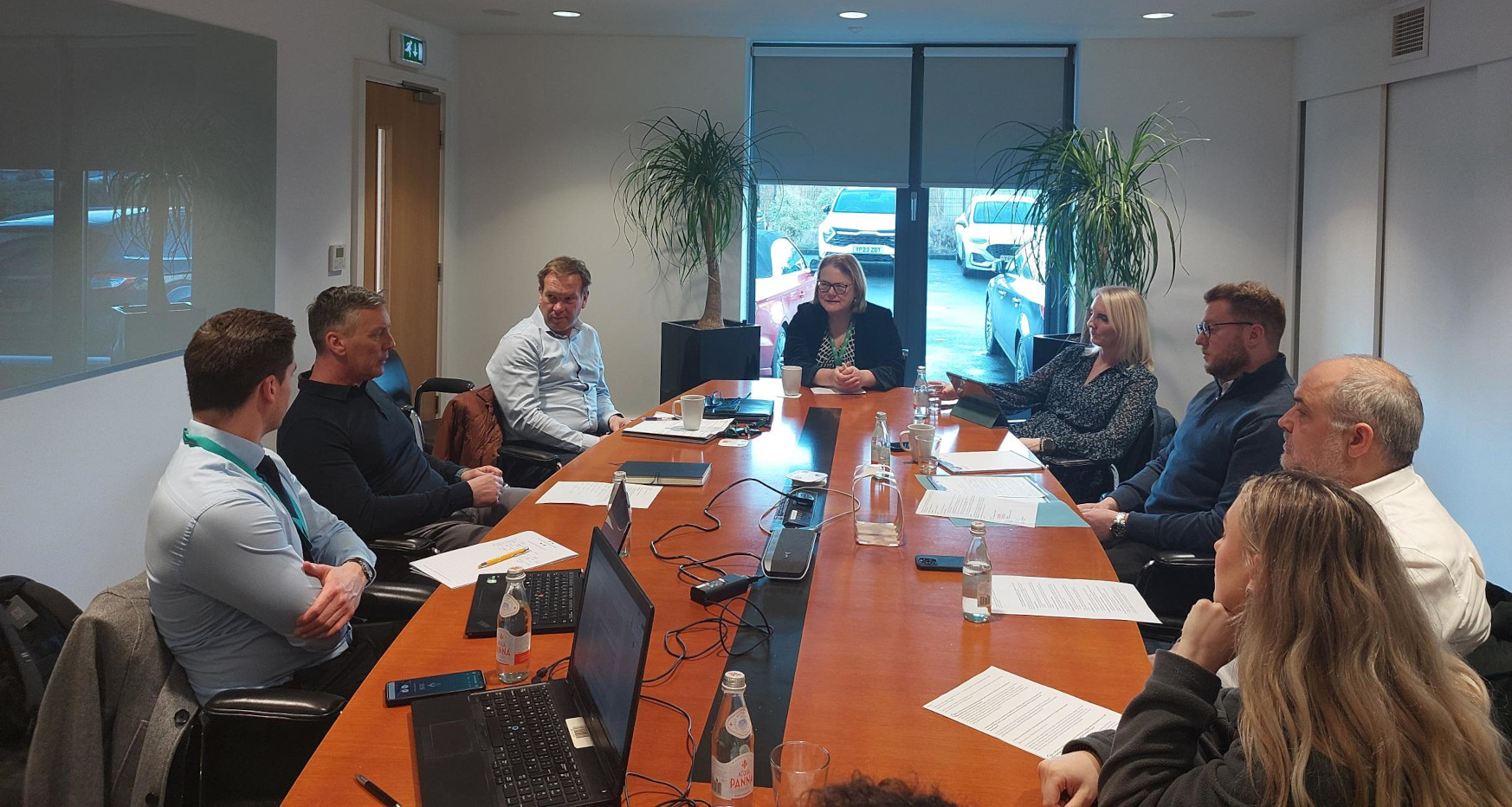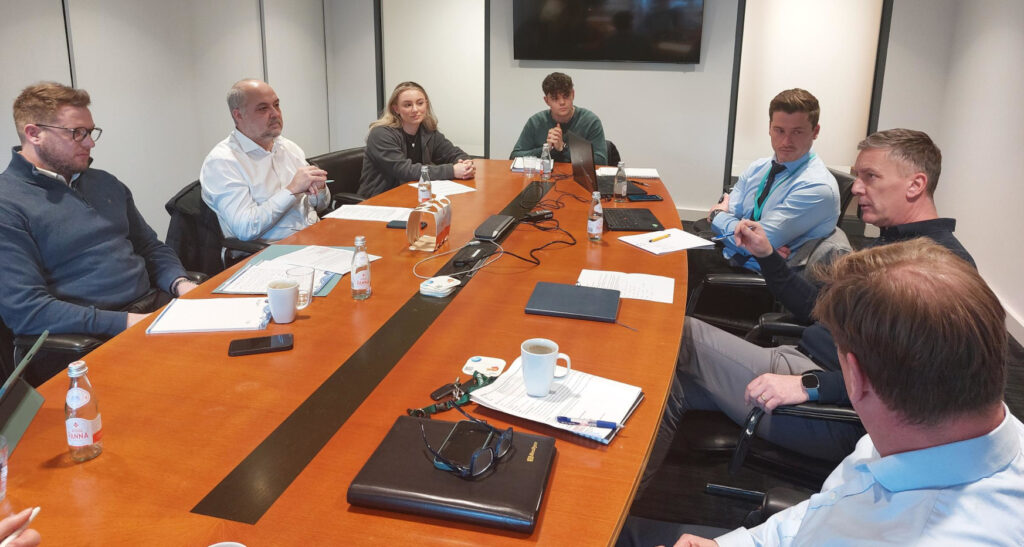
Chesterfield business leaders champion the benefits of nurturing our town’s young talent
Business leaders in Chesterfield are championing the role apprenticeships play in strengthening their industries, creating a culture of innovation and developing the workforce of the future.
A recent round table discussion, held with key figures from Chesterfield’s business community, highlighted how taking on apprentices can provide fresh perspectives, close skills gaps, and offer a sustainable way to train and retain talent.
From law firms and engineering companies to software developers and local authorities, businesses are embracing apprenticeships not just as a way to bring in young talent but also as a tool for developing their existing teams and securing the long-term future of their organisations.
For companies working in highly technical fields, apprentices bring a fresh skill set and a deep understanding of modern technology.
Nick Catt, Managing Director of Weightron Bilanciai, emphasised how younger employees have a natural ability to work with technology, making them a valuable asset to the business.
“Looking at it from the point of view of our Software Engineers, they’re able to do certain things which would take me much longer to do. Young people are able to sit and text with one hand whilst talking to you about something else. They’ve got a natural ability to understand technology like never before. We are investing a lot into cloud technologies, and the young people in my business are keen on being pushed with the new tools available to them.”
With businesses facing increasing challenges in recruitment, many are turning to apprenticeships as a way to bring in new talent and provide them with the skills needed to succeed in their industries.
Katie Ash, Director and Head of Employment Law at Banner Jones Solicitors, explained:
“Recruitment is hard, so we’re finding we must train people up. Apprenticeships are definitely a route into our profession, but it’s vital that we work with them to help them upskill and progress, so they want to stay with the business at the end of their course.”
Similarly, William Thomas, Workshop Manager at MSE Hiller, stressed that apprenticeships are crucial for ensuring businesses can develop the skills needed for the future.
“For us, it is about future-proofing. What we do is quite niche, so there has to be an element of passing on skills. We found that by taking on apprentices and tailoring their teaching, you can bridge that gap in the business. They’re able to learn from and aspire to be amongst the experienced engineers, which then gives our apprentices that drive to progress.”
Business leaders emphasised that apprenticeships are not just about filling immediate vacancies; they are an investment in the long-term future of the organisation.
Catherine Wenborn, Managing Director of Vines Legal Ltd, shared how taking on an apprentice had positively impacted her company.
“You’re getting somebody that’s literally just come out of school, meaning they’ve got a lot of fresh enthusiasm. If you can teach them the right way, you’ve got somebody who’s really going to go forward in the business. From our experience, we’ve brought someone into the organization who is willing to learn, and that has impacted quite successfully on our business so far.”
Pieter Eksteen, Education and Business Partnership Manager at the East Midlands Chamber, also highlighted how apprenticeships play a role in staff retention and leadership development.
“At the Chamber, we use the opportunity of apprenticeships to develop our permanent staff. So, we provide mentorship opportunities, which help people understand the rest of the business as well as just the department or role they are currently in. This helps us to develop our existing employees to take on leadership and management skills in the future. So, we’re looking at apprenticeships not just for young people, but also looking at it from the point of view of our existing employees to help retain the talent that’s within the Chamber.”
One of the key benefits of apprenticeships is the way they foster mentorship and professional development within a company.
Matt Close, UK Business Lead for NeoDyne, shared how taking on apprentices had helped other team members develop their own skills.
“We took two graduates on 18 months ago, and we also took on two apprentices back in September. This automatically gives the graduates someone to mentor and coach. They realise they’re not the youngest people in the business, and they know things that they can pass on to others. They’re able to reflect and realise what they’ve learned, which in turn helps them with their development.”
Charlotte Gladwin, an Apprentice Building Control Surveyor at DBCP, provided a first-hand account of how apprenticeships enable knowledge transfer between generations.
“Building control tends to have quite a high age profile. My mentor had never taken on a younger person before. The whole company can’t believe how well he has taken me in, and the wealth of knowledge he has been able to share with me has been phenomenal. He’s a great example of how skills and knowledge can be passed down to future generations.”
A crucial takeaway from the discussion was that apprenticeships instil a culture of continuous learning, which benefits businesses and employees alike.
Liam Jackson, Strategic Careers Hub Lead at the East Midlands Combined County Authority (EMCCA), observed:
“One valuable insight from this conversation is that, because apprentices gain their education while simultaneously learning on the job, this not only builds practical skills but also fosters a lifelong mindset of learning, curiosity, and continuous skill development, even in later stages of their careers.”
Max Denton, Skills Delivery Assistant for Chesterfield Borough Council, reinforced this view by explaining how apprenticeships contribute to long-term business success.
“For me, it’s not just about progression for the young person, but it’s important for the employer as well. From my experience, you get out of it what you put in. If you put in a lot of effort with your apprentices and provide them with the skill set to grow, you could potentially reap your rewards in later years down the line. You’ll have a fully-fledged member of the team who knows the organisation inside out, and therefore a team member who can take on other roles in future years. It’s a great asset when looking at succession plans, and that’s how I believe businesses should value apprenticeships.”
Apprenticeships offer a cost-effective alternative to traditional hiring, thanks to government support through the Apprenticeship Levy and co-investment funding. For non-levy-paying employers, up to 95% of training costs are covered, making it an affordable way to bring in new talent and develop existing staff. This funding can also help offset financial pressures, such as increased National Insurance contributions. Meanwhile, employers who contribute to the Apprenticeship Levy can maximize their investment by using the funds for training, ensuring they make the most of the resources available without incurring additional costs.
Is your business looking for support to take on an apprentice or upskill your team? Find out more at: https://www.chesterfield.co.uk/business/business-support/skills/
If you, or someone you know is considering their next career options, more information about apprenticeships in Chesterfield can be found at: https://www.chesterfield.co.uk/apprenticeships/



